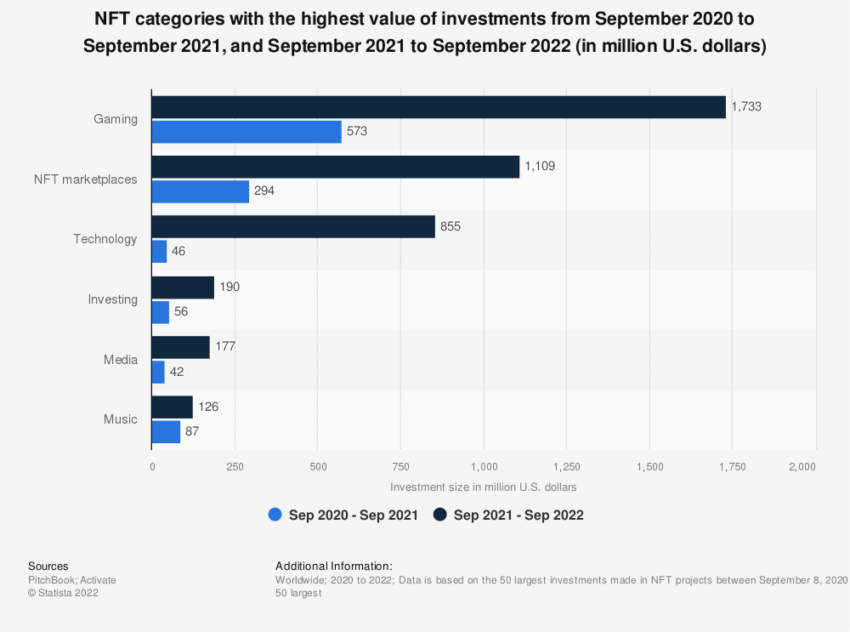NFT
In recent years, the digital landscape has undergone a paradigm shift with the emergence of non-fungible tokens (NFTs). As unique digital assets that can be owned, traded and verified through blockchain technology, NFTs have captivated the world and are now transforming industries far and wide.
From the democratization of the art world and the advancement of social justice, to the innovation of finance and the personalization of virtual experiences, NFTs are remarkably changing lives.
Revolutionizing the Art World: NFTs and Digital Property
The emergence of NFTs has been nothing short of transformative for the art world. In an era where digital assets have become increasingly valuable, NFTs provide a way to prove ownership and authenticity for unique digital creations.
NFTs enable artists to create, sell and transfer digital artwork while maintaining a secure and verifiable provenance record. This has led to record sales, with such notable pieces as Beeple’s “Everydays: The First 5000 Days.”
It grossed $69 million at auction and opened new opportunities for emerging artists to gain recognition.
In addition to financial opportunities, NFTs also break barriers to entry for artists from marginalized communities.
Through digital platforms, creators can now exhibit and monetize their work without the need for traditional gatekeepers such as galleries or art dealers. This democratization of the art market has led to an explosion of diverse and innovative work.
Artists use advanced technologies such as virtual reality and generative algorithms to create unique experiences.
Strengthen marginalized communities
The power of NFTs to advance social justice and support marginalized communities extends beyond the art world. They provide an alternative way to earn money and provide opportunities for self-expression. In addition, NFTs have become a powerful tool for advocating change and empowering underrepresented voices.
The Aku project is an example of the potential of NFTs to have a social impact.
It raised more than $2 million from the sale of a digital artwork of a young black astronaut, Aku. Proceeds from the sale were donated to organizations that focus on empowering young, underrepresented artists. Consequently, the potential for NFTs to be used for philanthropic purposes is demonstrated.
Similarly, initiatives from NFT social impact marketplaces such as Upland and Maxity promote spaces specifically designed for artists and creators working for social justice. By providing these individuals with a platform to showcase their work and connect with like-minded audiences, NFTs become a powerful catalyst for social change.
Responding to the future of finance
The influence of NFTs extends beyond the realm of art and social justice to the financial world with the emergence of trading strategy NFTs. These unique tokens represent ownership of specific trading algorithms, which investors can buy, sell and use to improve their trading portfolios.
Ocean Protocol, a decentralized data exchange platform, has embraced this concept by creating NFTs for trading strategies. It allows investors to take advantage of advanced market insights by tokenizing access to exclusive trading algorithms or ideas.
The protocol also rewards the creators of these strategies with a share of the profits generated.
This approach creates new revenue streams for algorithm developers and drives innovation within the trading community. As the financial industry continues to evolve, NFTs will play an increasingly important role in shaping the future of investing.
Digital Avatars and the Metaverse
NFTs are revolutionizing art, social justice and finance, personalizing the online experience through digital avatars. These unique, digital representations of individuals within virtual worlds and online platforms are increasingly tokenized as NFTs. It allows users to own, trade and monetize their virtual personas.
Platforms such as Decentraland and Sandbox, blockchain-based virtual worlds, allow users to create, buy and sell NFT-based avatars, clothes and accessories. As users interact with each other and participate in virtual events, these digital assets gain value and become an integral part of their online identity.
NFTs are also driving innovation in the gaming world. Blockchain-based games like Axie Infinity and CryptoKitties feature NFTs as in-game assets. These digital collectibles enhance the gaming experience and create new opportunities for players to benefit from their virtual adventures.
With the rise of the metaverse — interconnected virtual worlds where users can interact, socialize, and do business — digital collectibles are poised to play a central role in shaping how individuals express themselves and navigate these digital landscapes.
Environmental impact: tackling the carbon footprint
As NFTs continue to gain prominence and reshape various industries, concerns about their impact on the environment are emerging. The process of storing, trading and transferring these digital assets on blockchain networks like Bitcoin requires significant computing power and generates significant carbon emissions.
In response to these concerns, a growing number of artists, platforms and blockchain networks are taking steps to reduce the environmental footprint of NFTs. Some artists use eco-friendly platforms like Tezos or Flow, which use more energy-efficient consensus mechanisms than Bitcoin.
Blockchain networks are exploring new technologies and approaches to further reduce the environmental impact of NFTs. For example, Ethereum’s move to the more energy-efficient Proof-of-Stake (PoS) consensus algorithm has reduced energy consumption by up to 99.95%.
The growing influence of NFTs
NFTs have proven to be much more than just digital JPEGs. They are transforming industries, empowering marginalized communities and redefining online experiences.
As technology continues to advance and the world becomes increasingly digital, NFTs are poised to play a role in shaping the future.

NFTs by market sector. Source: Statistics
From revolutionizing the art world to advancing social justice, driving innovation in finance, and personalizing the metaverse, NFTs are undeniably life changing.
Still, the market must navigate through the challenges and opportunities presented by this new frontier. It is critical to foster an inclusive, sustainable and collaborative environment that harnesses the full potential of NFTs to create a better future for all.

